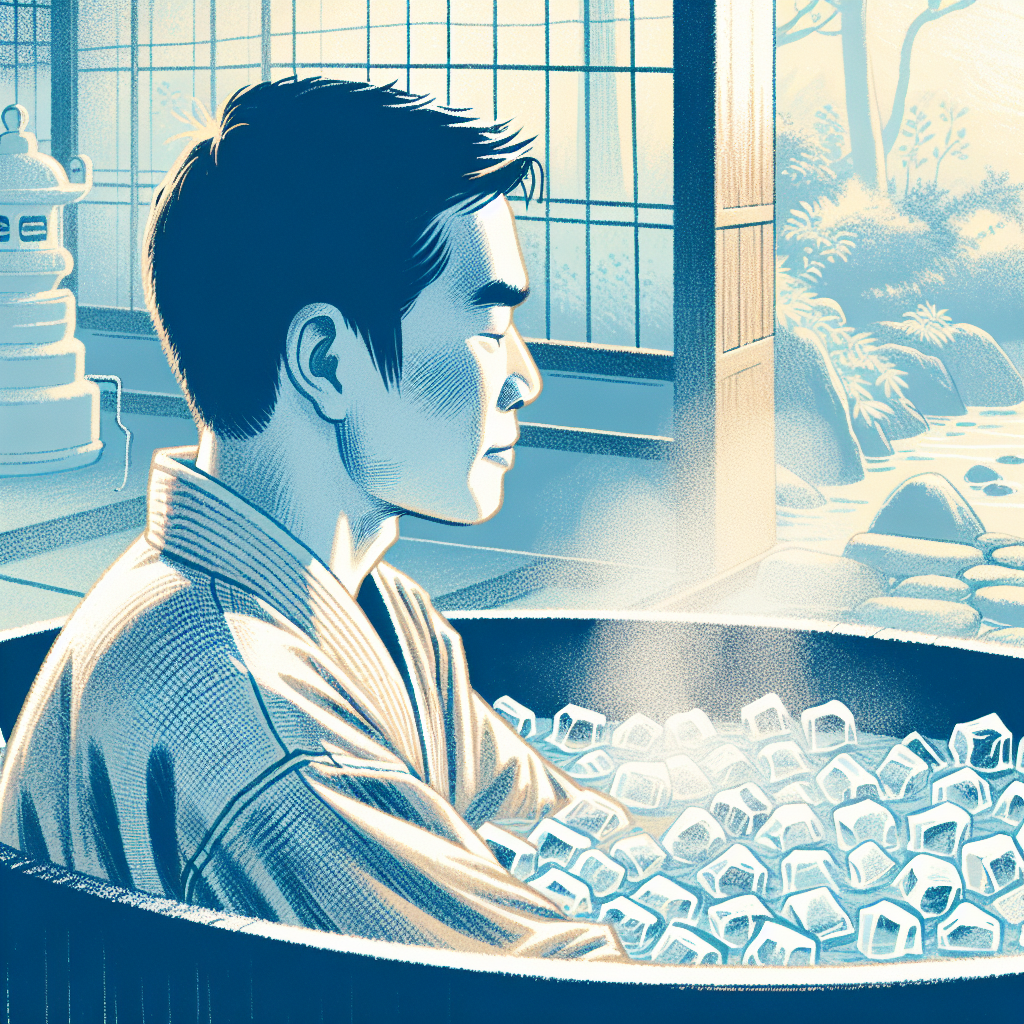With a chilling splash, you immerse yourself into the world of “The Mind-Body Connection: Mental Health Benefits Of Ice Baths.” In just moments, you will uncover the profound impacts of this age-old wellness practice, which are much more extensive than a sudden jolt of energy. Unravel the mystery behind the cold therapy of ice baths and enlighten yourself on how they are not only bolstering physical strength but also fostering mental resilience. You’re about to learn how icy submersions can enhance your psychological wellbeing, reduce stress, and empower the mind, making you both physically strong and mentally sound.

What are ice baths?
Definition of ice baths
An ice bath is a form of cold therapy where you immerse your body, or part of it, in ice-cold water for a specific duration. Typically, you fill a tub with ice, then add water, creating a chilly soak that can drop to temperatures as low as 50 to 59 degrees Fahrenheit. Although intense, it’s a method used by many athletes to rejuvenate their muscles after rigorous training sessions.
Brief history of ice baths
the use of ice baths for therapy goes back centuries. Ancient civilizations such as the Romans, who revered the power of water therapy, used cold bathing rooms, or frigidariums, as part of their bathing rituals. In recent decades, sports and fitness enthusiasts have adopted this practice, believing in its ability to speed up recovery, reduce muscle inflammation and enhance performance.
Ice baths for athletic recovery
Many athletes swear by ice baths as an integral part of their recovery process. The theory is that the cold water causes the blood vessels to constrict, reducing inflammation, flushing waste products, and enhancing the uptake of oxygen and nutrients in the muscles. This process helps to reduce muscle soreness and enhance recovery after strenuous exercise.
The mind-body connection
Understanding the mind-body connection
The mind-body connection refers to how your thoughts, feelings, and mental state can impact your physical health and well-being. For instance, stress can cause physical symptoms like headaches or stomach upset. Similarly, chronic pain or disease can affect your mental health, leading to conditions such as depression or anxiety. The mind and body are intricately intertwined, continually influencing each other.
Role of stress in mental health
Stress plays a significant role in your mental health. Consistent high levels of stress can lead to a range of mental health issues including anxiety, depression, and sleep disorders. Regularly experiencing high levels of stress can also impair your cognitive function, impacting areas like concentration and memory.
Impact of physical sensations on mental well-being
Physical sensations, like the feeling of icy water against your skin during an ice bath, can heavily impact your mental well-being. Some individuals find these sensations invigorating, helping to clear the mind and refocus thoughts. Additionally, overcoming a physical challenge like enduring the cold can boost self-esteem and a sense of accomplishment, which positively influences mental health.
Mental health benefits of ice baths
Reduction of stress and anxiety
Ice baths can act as a type of holistic stress therapy. the initial shock of the cold water triggers your fight-or-flight response, increasing alertness and oxygen intake. As you become more accustomed to the cold, your body learns to manage the stress response better, which can translate into better stress management in daily life.
Improvement of mood and sense of well-being
Immersing in cold water can stimulate endorphin production – the feel-good hormones in your body. This release of endorphins can help improve your mood, creating a sense of happiness and well-being, which can also help to fend off depression.
Enhancement of cognitive function
The rush of adrenaline and increased oxygen circulation triggered by cold immersion can stimulate your brain, enhancing cognitive function. This stimulation can increase mental clarity, energy, and even improve memory.
Promotion of better sleep
After an ice bath, you may find yourself feeling calm and relaxed. This state aids in battling insomnia, promoting more profound and restful sleep.
Alleviation of symptoms of depression
A study found that cold showers could send an overwhelming amount of electrical impulses to the brain, producing an anti-depressive effect and mood boost. It’s believed that a similar reaction could take place during ice baths.
Boosting self-esteem and body image
Enduring the cold can also give you a confidence boost. Fighting through the initial discomfort and achieving what you thought was impossible can elevate your self-esteem, and with consistent practice, can assist in fostering a more positive body image.

Physiological effects of ice baths on mental health
Activation of the parasympathetic nervous system
Regularly immersing yourself in cold water can help activate the parasympathetic nervous system – the part of your body responsible for rest and recovery. This activation promotes relaxation and counteracts stress, thereby supporting mental well-being.
Release of endorphins and neurotransmitters
Cold exposure triggers a rush of adrenaline and endorphins, which are natural painkillers and mood enhancers. This release can produce a euphoric feeling known as the ‘runner’s high.’
Decrease in inflammation and pain perception
As your body adapts to the cold, your perception of pain can decrease. This change can improve your resilience and capacity to cope with physical and mental stressors.
Impact on hormonal balance
Regular exposure to cold enhances the release of various hormones, including adrenaline and endorphins, which play a significant role in managing stress, anxiety, and depression.
Ice baths and meditation
Combining cold exposure with meditation
Combining the practice of ice baths with meditation can provide an even more profound mind-body connection. Focusing on your breath while in cold water can transport you into a deep meditative state, enhancing mindfulness and mental clarity.
Enhancing mindfulness and focus
Withstanding the cold requires you to be in the present moment entirely, heightening your level of focus and consciousness. This mindfulness can help you gain greater clarity and awareness in your everyday life.
Deepening the mind-body connection
Practicing regular ice baths can help you instinctively tap into your body’s reactions and how they influence your mind. This action deepens the mind-body connection, promoting greater self-awareness and mental health regulation.
Tips for safely practicing ice baths
Gradual exposure to cold
Like any new therapy, it’s crucial to introduce your body to cold temperatures bit by bit. Start with shorter, less intense sessions and progressively increase the duration and coldness as your body adapts.
Duration and frequency of ice baths
The recommendation for ice bath duration varies, but a good rule of thumb is to limit your sessions to 10-15 minutes. Regarding frequency, two to three times a week seems to be the sweet spot for most individuals.
Monitoring body temperature
Monitoring your body’s reaction to the cold is vital for safety. If you ever start to feel too uncomfortable or if your body temperature drops too low, it’s essential to exit the bath.
Consulting with a healthcare professional
Before starting ice baths, it’s always a good idea to consult with a healthcare professional. They can provide guidance based on your specific health conditions and goals.
Listening to your body
As with any physical activity, listening to your body is crucial. If something doesn’t feel right, it’s important to stop immediately and seek medical assistance if necessary.
Alternatives to traditional ice baths
Cold showers
If ice baths seem daunting, a cold shower can be a great starting point. Cold showers can offer similar benefits, and you can control the temperature to best suit your comfort level.
Cryotherapy
Cryotherapy is another cold therapy where you expose your body to extremely cold temperatures (below -100°C) for short periods. This method is usually performed in special chambers at wellness centers.
Ice packs and localized cold therapy
If you want to target specific areas of your body, using ice packs or localized cold therapy can be an effective alternative to ice baths.
Precautions and contraindications
Individuals with certain medical conditions
People with certain health conditions, like cardiovascular disease or Raynaud’s disease, should avoid ice baths as they could potentially worsen their symptoms.
Pregnancy and ice baths
Pregnant women should also stay clear of ice baths. Changes during pregnancy make the body more sensitive to temperature extremes, making cold therapies potentially hazardous.
Importance of gradual adaptation
It’s crucial that you give your body time to adapt to the cold. Rushing it and forcing yourself to endure temperatures that your body is not ready for can lead to cold stress or hypothermia.
Personal experiences and testimonials
Stories from individuals who practice ice baths
There are countless personal stories from those who practice ice baths regularly, noting benefits like improved mood and increased resilience. Some people have even credited ice baths as being pivotal in overcoming depression and anxiety.
Benefits they have experienced
Individuals who regularly take ice baths often report feeling more energized and focused after a session. Others have noticed improved sleep patterns, reduced stress levels, and an increased sense of well-being.
Lessons learned and tips
Some consistent advice shared by those who practice ice baths is to start small. Begin with milder temperatures and shorter durations, and gradually increase as your body adapts.
Conclusion
Summary of the mental health benefits
Ice baths offer a unique and holistic way to enhance mental health. They can help decrease stress and anxiety, boost mood, enhance cognitive function, and even help to alleviate symptoms of depression.
Encouragement to explore ice baths
Perhaps it’s time to think about giving ice baths a try. Start small, monitor your reactions, and before you know it, you could be experiencing the mental health benefits firsthand.
Further research and exploration
Given the potential mental health benefits of ice baths, further research and exploration in this area are warranted. Understanding the mechanisms that underlie these benefits could pave the way for more therapies that integrate physical wellness with mental health.
